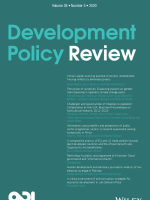Declining significance of neoliberalism?
International norm-setting has become an important business in development cooperation. Governments regularly meet, for instance, at the United Nations to negotiate how development problems should be addressed. The 2030 Agenda, the Sustainable Development Goals and the Addis Ababa Action Agenda on financing for development are such examples of international norm-setting indicating how countries ideally should develop and what actors should do and not do.
What influences this norm-setting? One set of ideas that have dominated economic policies and international cooperation for many years is neoliberalism. This set of ideas which emphasises the effectiveness of the market in solving development problems, is however rather diffuse. One thing is that it evolves over time, another that it is often referred to normatively as an undefined and negative approach jeopardizing human development.
In a new article, Lars Engberg-Pedersen discusses how to understand current neoliberalism and analyses its influence on the above-mentioned international agreements. He concludes that clear neoliberal ideas do exist, but they have been challenged in these recent agreements seeking to frame development activities. Neoliberal tenets, such as the primacy of the market and the usefulness of inequality, are no longer taken for granted. While neoliberalism may be alive and kicking in many contexts, it cannot be assumed to dominate international norm-setting on global development.
DIIS Eksperter

